Alumni, Intel ISEF, ISEF, Regeneron ISEF, Young & Amazing
Beyond the Fair: the transformative impact of the Gordon E. Moore Award on young scientists
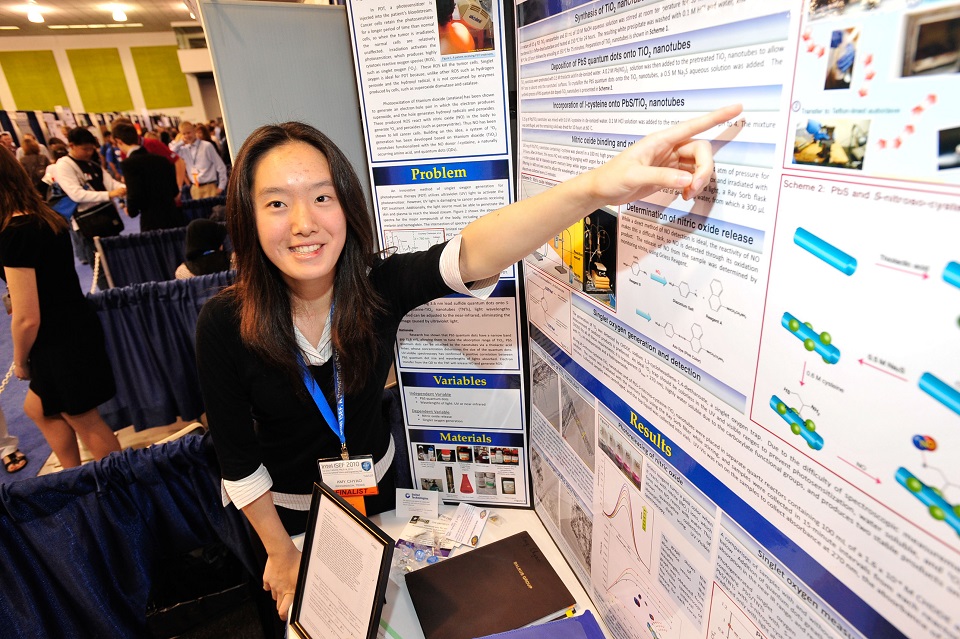
On March 25, 2023, the scientific community lost scientific luminary, philanthropist and visionary thinker, Gordon E. Moore. At the age of 94, Moore leaves behind an enduring legacy as a technologist, an entrepreneur and supporter of the next generation of STEM leaders.
Moore was the first to observe what later became known as Moore’s Law, the prediction that computers would become much more powerful in the future because of tiny electronic components that would allow them to do more and more with each passing year. Moore foresaw that these components, called transistors, would be doubled in number on a silicon chip at regular intervals, resulting in a rapid increase in the speed and efficiency of computers.
Moore, who co-founded Intel Corporation in 1968 with Robert Noyce, had a long-standing affiliation with the International Science and Engineering Fair (ISEF), which was sponsored by Intel for many years prior to its current title sponsorship by Regeneron.
He was a visionary thinker who cared deeply about nurturing the next generation of problem-solvers and STEM leaders. His commitment to supporting young scientists led to the establishment of the Gordon E. Moore Award, one of the most prestigious awards at ISEF. Today, the Gordon E. Moore Award for Positive Outcomes for Future Generations continues to recognize Regeneron ISEF finalists who demonstrate a deep commitment to making a lasting difference for future generations through their rigorous scientific inquiry, and passion for discovery and invention, thereby honoring Moore’s legacy. The award is generously supported by the Gordon and Betty Moore Foundation.
In addition to sponsoring this annual $50,000 award for a top Regeneron ISEF winner, the Gordon and Betty Moore Foundation also supports the Regeneron ISEF Equitable Access Fund for Affiliated Science Fairs, which helps ensure that students throughout the 400 affiliated fairs of ISEF have enhanced research opportunities the world over. In total the Foundation has committed to giving $866,000 over five years in support of global STEM research education.
Moore remains a beacon of inspiration for all who follow in his footsteps. Below, you can read some heartwarming tributes from recipients of the Gordon E. Moore Award over the last decade, arranged chronologically according to the year in which they won.
2010
Amy Chyao (Richardon, Texas, USA)
ISEF Project Title: Lights, Quantum Dots, Action!
Job Title: Associate at Quinn Emanuel
Amy was the first recipient of the Gordon E. Moore Award, established in 2010, when she was just sixteen years old. Since then, she has gone on to graduate from Harvard Law School in 2019 and has worked in litigation roles in both the private and public sectors, where her science research background has proven to be an asset.
Reflecting on his recent passing on her birthday, Amy said, “Gordon Moore left an exceptional legacy on science and the world. In building my career and life, I have often reflected on the weight of receiving an honor bearing his name. I feel a kinship with him in many respects—whether an interest in chemistry since childhood, or a love of nature shared with a spouse, or even some similar personality traits. Gordon Moore expressed through his life’s work an abiding belief in humanity’s progress and betterment. This was, in a way, implicit in Moore’s Law itself, but most evident through his significant philanthropic contributions—in fact, today, the full name of the Gordon E. Moore Award is the Gordon E. Moore Award for Positive Outcomes for Future Generations. Gordon Moore’s life is a continual source of inspiration to me, and it remains the honor of my lifetime to have received his namesake award. I hope future generations will continue to draw inspiration from his life and legacy.”
+++
2011
Blake Marggraff (Lafayette, California, USA)
Project Title: Treatment of Simulated Cancer Cells with Compton Scattering-Produced Secondary Radiation
Job Title: CEO at CareSignal – a Lightbeam Company
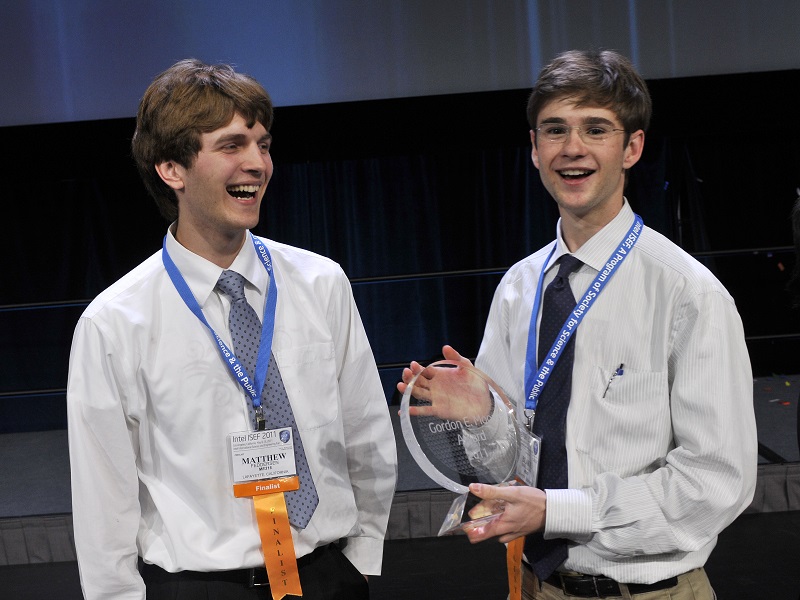
How old were you when you won the Gordon E. Moore Award, and what have you been up to since then?
I received the Gordon E. Moore Award in 2011, along with Matthew Feddersen, when I was 18 years old for research on low-cost enhancements to radiation oncology treatments using tin microparticles and novel cell death quantification techniques. Subsequently, I attended Washington University in St. Louis where I studied biology on a pre-medicine track. Almost accidentally, however, I discovered and became passionate about mission-driven entrepreneurship via a mentor I met during ISEF. While finishing my undergraduate degree, I co-founded and grew a STEM education and technology business. After graduating, I started a venture-backed healthcare technology company which was acquired in late 2021.
How did winning the Gordon E. Moore Award at ISEF impact your life and career goals?
The research behind my project took place completely in the back of a public high school classroom with about $200 of materials that my inspiring A.P. Biology teacher, Jay Chugh, helped source. To say I felt dwarfed by the sophistication of my brilliant peers’ work at the first major science fair I had ever attended would be an understatement. However, as I have been privileged to learn from mentors, investors and collaborators, many of whom I met as a result of my ISEF experience, grit and vision can be force multipliers in every part of life. My ISEF journey also deepened my conviction in the importance of evidence when developing any new technology. My digital health company, for example, began by collaborating with dozens of world-class researchers to achieve independent validation of clinical impact. At the time, this type of approach was nearly unprecedented in the startup world but has since become a requisite in the industry. Strong research and validation, in my view, is neither a luxury or a burden, but instead a necessity to most effectively refine and advance innovations.
How do you believe you are living up to Gordon E. Moore’s legacy and ideals in your current work or studies?
Winning this award is uniquely humbling. I have reflected deeply on a central mission for myself that might approach the monumental and positive impact of Gordon Moore’s inventions and leadership. In my lifetime, I intend to create companies and products that result in the addition of one billion healthy, productive years of life (known as Quality Adjusted Life Years, or QALYs) to humanity.
The company that I started in 2015, CareSignal, creates patient monitoring solutions and has served hundreds of thousands of patients across the country with chronic, behavioral health, addiction, social determinants of health and maternal health challenges, improving their healthcare outcomes while reducing cost for the U.S. healthcare system and its hard-working healthcare providers. Through this venture, I strive to live up to Gordon Moore’s leadership in innovation, industry and philanthropy. I am deeply grateful for the opportunities that the Regeneron ISEF creates for young scientists and engineers and firmly believe it is among the most effective catalysts for positive impact in the world.
+++
2015
Raymond Wang (Vancouver, Canada)
Project Title: Aircraft Cabin Airflow: Curbing Disease Transmission
Job Title: Co-Founder, CEO at AeroVect
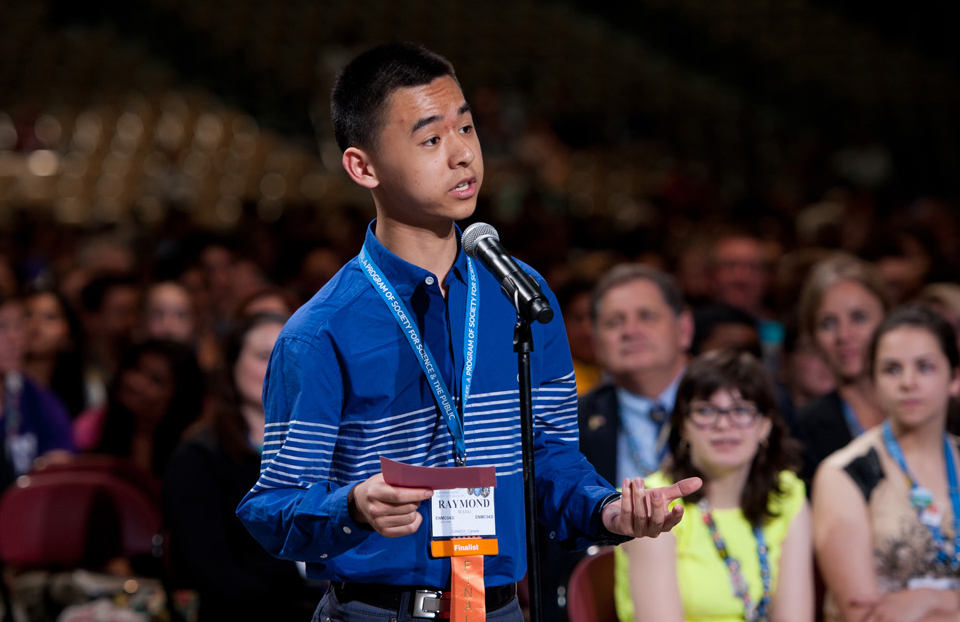
How old were you when you won the Gordon E. Moore Award, and what have you been up to since then?
At 17, receiving the Gordon E. Moore Award at ISEF opened my eyes to the powerful impact and fulfillment of a career in engineering. Since then, I’ve graduated from Harvard in computer science, picked up a pilot’s license, and in 2020, commercialized my patented ISEF invention to help combat COVID’s spread in air travel. Now 25, I most recently founded AeroVect, a startup deploying autonomous driving for airport ground logistics at some of the busiest hubs in the world. Gordon Moore’s legacy has undoubtedly left a lasting impact on our generation, and I’m excited for the future we’ll continue to create, standing on his shoulders.
How did winning the Gordon E. Moore Award at ISEF impact your life and career goals?
ISEF was a pivotal moment in my high school journey, where I was fortunate to meet many lifelong friends from around the globe, who continue to inspire me with their burning passions for creation and relentless spirits for perseverance today. It was also ISEF that challenged me to dig deeper into my passions at the intersection of technology and aviation. It is truly an honor to be a small part of this extraordinary movement, and I’m deeply appreciative of Dr. Moore’s enduring legacy, both directly and through Intel, for creating the nurturing environment that ISEF has offered.
How do you believe you are living up to Gordon E. Moore’s legacy and ideals in your current work or studies?
Undoubtedly, Gordon Moore’s legacy has been a powerful inspiration for many in our generation. His unrelenting perseverance, humble ingenuity and incredible ability to bring together brilliant minds are a constant reminder of the immense global impact that a small group of dedicated individuals can make. In our startup journey at AeroVect, we strive to uphold these ideals every day, aiming to emulate the dynamic and collaborative atmosphere Moore fostered at Intel alongside Andy Grove and Robert Noyce. I am grateful for the tremendous, far-reaching impact that Dr. Moore has had on all of us, and hope to carry these ideals forward as we shape an even brighter future together.
+++
2016
Austin Wang (Vancouver, Canada)
Project Title: Boosting MFC Biocatalyst Performance: A Novel Gene Identification and Consortia Engineering Approach
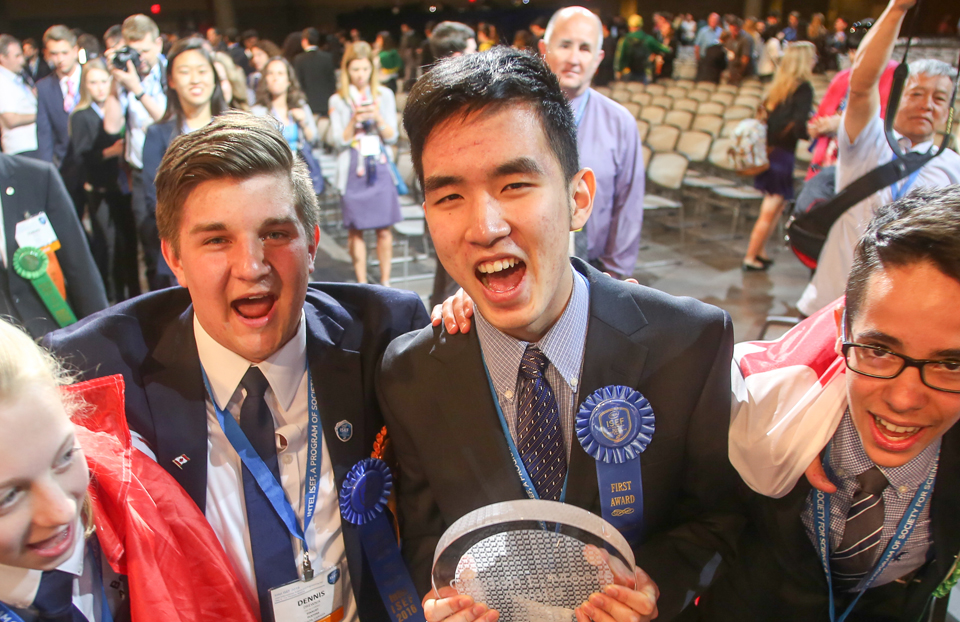
How old were you when you won the Gordon E. Moore Award, and what have you been up to since then?
I was 18 years old when I won the Gordon E. Moore Award. I am now 25 years old and two years into a Ph.D. program in computer science at Princeton, where I am doing research on AI and natural language processing (NLP).
How did winning the Gordon E. Moore Award at ISEF impact your life and career goals?
It helped prove to myself that anything is possible if you persevere. During college, I decided to pivot from microbiology to computer science. Although I found myself behind and out of my depth on numerous occasions, I pushed through, and now I am doing impactful things that I enjoy.
How do you believe you are living up to Gordon E. Moore’s legacy and ideals in your current work or studies?
The way Gordon E. Moore was able to inspire others through this award is something that I try to live up to. Using a portion of the award money, together with the generosity of other alumni donors, I was able to establish a scholarship fund at my high school to offset the cost of student science and community projects. Gordon Moore has also inspired me to give back, not only financially, but also with my time. I have mentored countless high school students since winning the award. For instance, last year, I volunteered to teach an AI and machine learning course in Mysore, India, and this summer I will be teaching NLP to high school students at AI4ALL. With his philanthropy and generosity, Dr. Moore has inspired us to pay it forward, and because of that I truly believe Dr. Moore has made life-changing contributions that extend far beyond those he reached with his award.
+++
2018
Oliver Nicholls (Sydney, Australia)
Project Title: Autonomous Window Cleaning Robot for Commercial High-Rise Buildings
Job Title: Software Engineer at ResMed
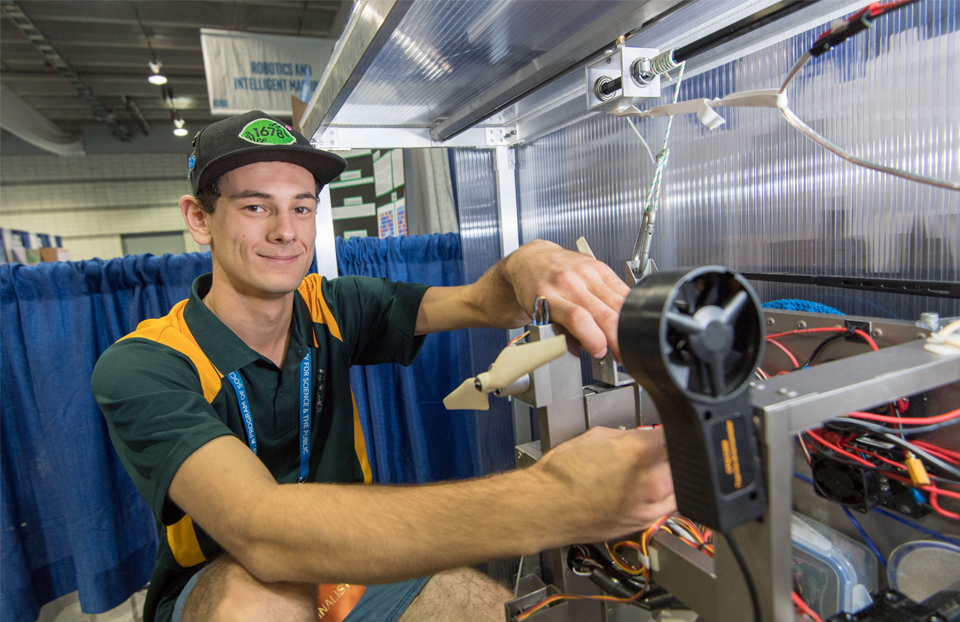
How old were you when you won the Gordon E. Moore Award, and what have you been up to since then?
I was 18 when I won the award in May 2018. Since then, I have completed a Mechatronics Engineering degree with First Class Honors at UNSW Sydney and had my undergraduate thesis published in the Journal of Nuclear Materials. I have also worked at a startup working on window-cleaning robotics (the subject of my ISEF project) for two years before changing jobs to work in embedded software at a medical device company for nearly the last year.
How did winning the Gordon E. Moore Award at ISEF impact your life and career goals?
With the Gordon E. Moore Award, I was fortunate to have a financial situation where I could focus fully on my university degree, giving it my all every day and allowing me to achieve the results I did. I had been in the process of organizing an international internship in the United States through connections I made with other Gordon E. Moore Award winners along with FIRST Robotics, but unfortunately that fell through because of COVID. The award has also given me publicity and exposure; people could more readily find me online, which helped with a startup I founded and even led to a valuable internship opportunity. Having this award on my resume also helped me get my current job, where I am working on a large complex project.
How do you believe you are living up to Gordon E. Moore’s legacy and ideals in your current work or studies?
On one level being a Mechatronics and Software engineer is in line with Gordon E. Moore’s legacy in computing. Moore also focused much of his efforts in philanthropy and in making others’ lives better. At ResMed, I work on a team creating software for CPAP and respiratory care devices which drastically improves the lives and health outcomes of those with chronic conditions such as sleep apnea or COPD. This combination I believe is the embodiment of Moore’s legacy, one for which I can be proud.
+++
2019
Krithik Ramesh (Greenwood Village, Colorado, USA)
Project Title: Utilizing Computer Vision and Machine Learning Systems to Develop a Live Time Navigational and Surgical Aid for Spinal Reconstructions
Job Title: Undergraduate Researcher at Broad Institute of MIT and Harvard
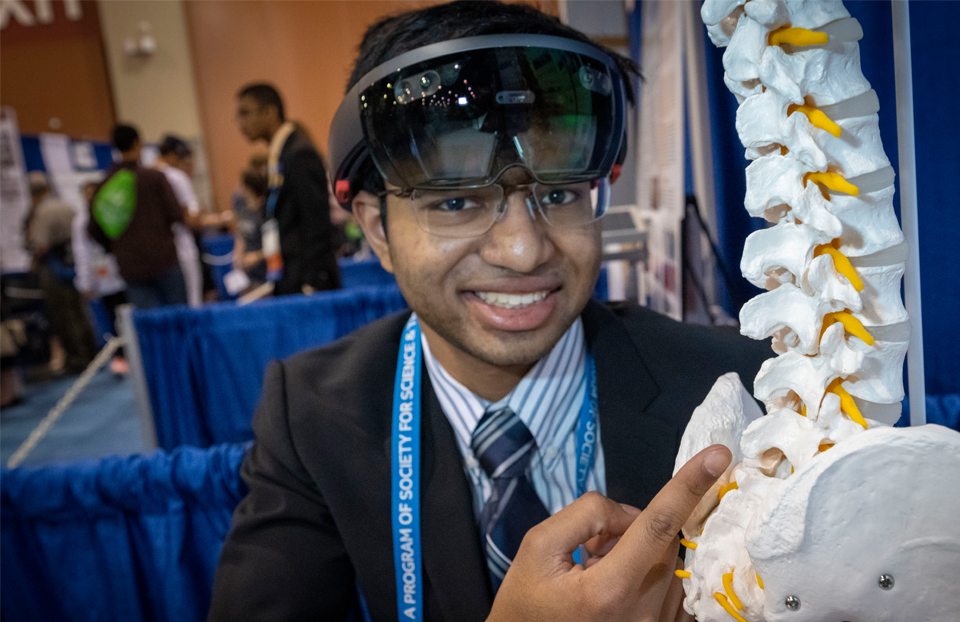
How old were you when you won the Gordon E. Moore Award, and what have you been up to since then?
I was 16 years old when I won the Gordon E. Moore Award. Now, I attend MIT in Cambridge, Massachusetts where I study computer science and molecular biology. Also, since ISEF, I was named to Smithsonian Magazine’s Innovators to Watch list and Encyclopedia Britannica’s 20 under 40 Change Makers in medicine. I currently work in the Sabeti Lab at the Broad Institute of Harvard and MIT and on computational phylogenetics and CRISPR detection platforms for infectious diseases. I spend my time attempting to better understand biological phenomena through machine learning. I am currently 20 years old and intend to pursue an MD-PhD after graduation.
How did winning the Gordon E. Moore Award at ISEF impact your life and career goals?
This was one of the most influential moments of my life. ISEF introduced me to top researchers around the world, some of whom I work for now. At times, I still remember when I won this award, reinforcing my commitment to academia and pursuing a career in research. This award has given me the privilege of working with my scientific heroes, and one day I hope to follow in their footsteps and have my own lab that aims to address pressing issues at the intersection of AI and biology.
How do you believe you are living up to Gordon E. Moore’s legacy and ideals in your current work or studies?
I strive to embody Dr. Moore’s commitment to scientific innovation and technical progress. I hope that the research I do at MIT and for the rest of my career will end up leading to cures for genetic disorders and preventing the next pandemic.
+++
2021
John Benedict Estrada (Fresno, California, USA)
Project Title: Development of a Novel AI Drought-Stress Assessment Model in Bell Pepper (Capsicum annuum) Plants Using a Custom-Built Robotic RGB + Infrared Camera
Currently: Senior at Clovis North High School in Fresno, Davidson Fellow
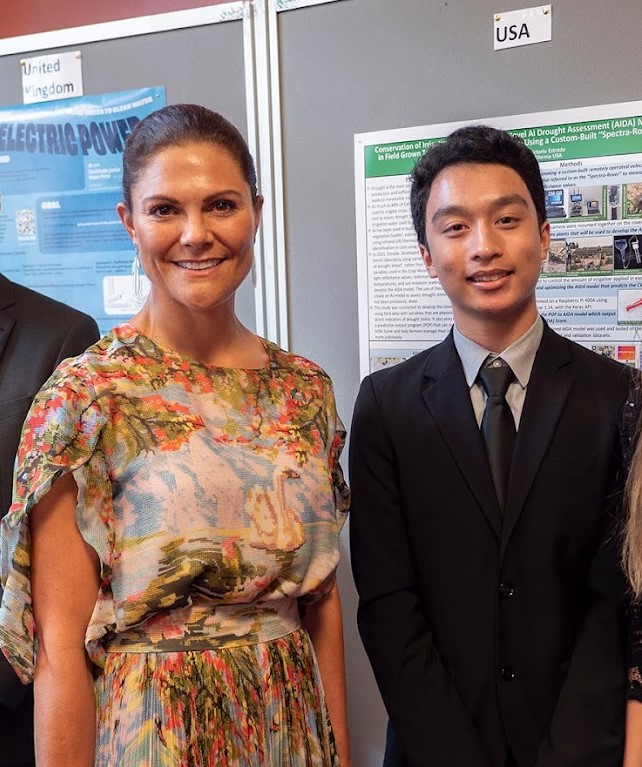
How old were you when you won the Gordon E. Moore Award, and what have you been up to since then?
I was 16 in 2021 and am now 18. I competed and won this award at ISEF 2022. I have also been awarded the Davidson Fellows Scholarship and the U.S. Stockholm Junior Water Prize.
How did winning the Gordon E. Moore Award at ISEF impact your life and career goals?
Winning the Gordon E. Moore Award in 2021 solidified my commitment to making a positive impact in the world. I realized those who take initiative are the individuals who create a positive impact on society. I view this award as not an end, but rather a beginning of a lifelong journey to try to change the world for the better.
How do you believe you are living up to Gordon E. Moore’s legacy and ideals in your current work or studies?
I have been trying my best to live up to my benefactor’s enduring legacy, especially in the field of computer science. After receiving the award in 2021, I continued with my AI Drought Assessment Model development and successfully conducted a field trial on tomato plants where I demonstrated its practical use, potentially saving 26 billion gallons of water in California alone. This project won me not only the first grand award at ISEF 2022 but also a $25,000 Davidson Fellows Scholarship that I can also use for college, as well as the US Stockholm Junior Water Prize (SJWP). I then represented the USA at the Global SJWP in Sweden where I presented my project to the Crown Princess of Sweden, HRH Princess Victoria.
Despite these awards and accolades, I believed my work was not done, so I continued to study hard in high school and was eventually admitted to Gordon E. Moore’s alma mater in my senior year, the University of California, Berkeley. This year is the first time that UC Berkeley is allowing direct admission into their high-demand programs as a freshman. I am proud to be one of their first direct entrants into the Letters and Sciences computer science major. As one of their top applicants, I was also awarded the Regents and Chancellor’s Scholarship – their highest merit scholarship for incoming freshmen. It was during the orientation of this prestigious scholarship that I saw Gordon E. Moore’s name inscribed in one of the buildings on campus, and that moment truly inspired me, and I felt that it was a sign that I am making a step in the right direction in living up to his legacy and ideals.
+++
2022
Napassorn Litchiowong (Pleng)
Project Title: BiDEx – A Screening System for Rapid Proactive Detection of Patients With Liver Fluke Infection Using a CNN Model To Detect Orphistorchis viverrini Eggs From Microscopic Fecal Images and a NN Model for Infection Risk Assessment
Job Title: Intern at National Electronics and Computer Technology Center (NECTEC); Co-Founder BiDEx
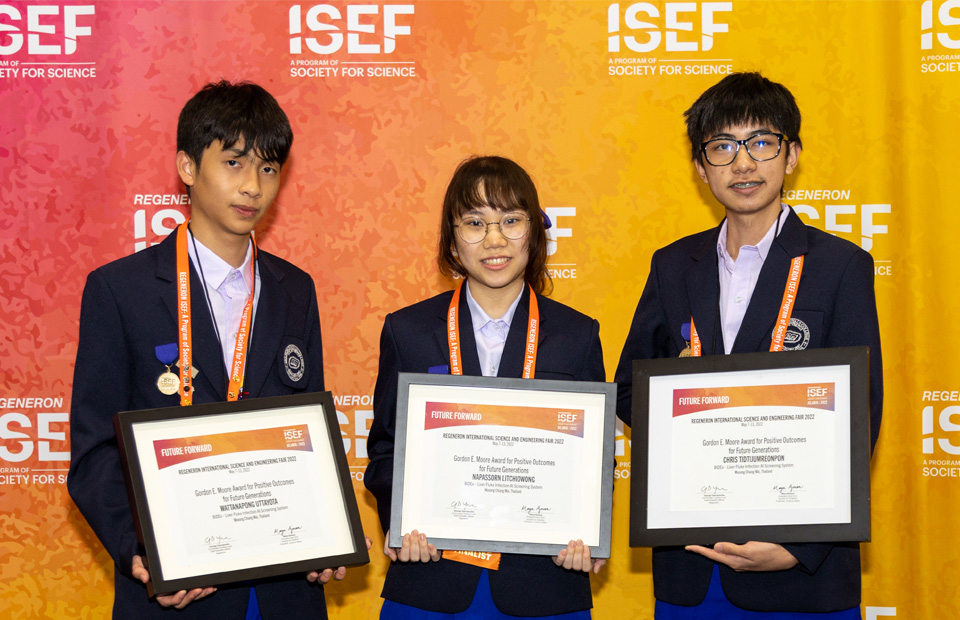
How old were you when you won the Gordon E. Moore Award, and what have you been up to since then?
I received the award when I was 17 years old. Since then, my passion for helping my community has led me to develop projects like a video call chatbot that utilized AI techniques to detect depression in teenagers. Now, at 18, I am determined to continue creating projects that embody the spirit of the award, striving to leave a lasting, positive impact on the world.
How did winning the Gordon E. Moore Award at ISEF impact your life and career goals?
It has had a profound impact on my life and the lives of young people around me. Our project “BiDEx”, aimed at assisting with local diseases in our country, sparked a wave of inspiration among my peers. Students in my school began to develop projects addressing local problems across diverse fields like science, medicine, art, and politics, creating positive change within our community.
This award has fueled my own passion to contribute further to society. The award’s identity has become the guiding mission of my life—to help others. This has influenced my career goals as well. No longer solely focused on technology, I am now determined to study public policy and government. My aim is to harness technology’s potential and advocate for its integration into nationwide systems that will alleviate the suffering of countless people.
How do you believe you are living up to Gordon E. Moore’s legacy and ideals in your current work or studies?
I endeavor to create solutions that address social issues and improve lives. Alongside my projects, I also plan to pursue college majors that enable me to examine the wider implications of technology and find ways to use it for the greater good. I hope to contribute to a lasting, positive impact on society, aligning with Gordon E. Moore’s vision and values.
+++
2022
Chris Tidtijumreonpon
Project Title: BiDEx – A Screening System for Rapid Proactive Detection of Patients With Liver Fluke Infection Using a CNN Model To Detect Orphistorchis viverrini Eggs From Microscopic Fecal Images and a NN Model for Infection Risk Assessment
Currently: Studying Chinese at the University of Chengdu and, Co-Founder BiDEx
How old were you when you won the Gordon E. Moore Award, and what have you been up to since then? How old are you now?
I was 16 years old when I won the Gordon E. Moore Award and am 17 now. When my team received the Gordon E. Moore Award, we were still in 12th grade, so after the competition we mainly prepared for college admissions. After we graduated near the end of February, (Thailand’s curriculum schedule is a little different from the U.S.) we all went our separate ways. I came to study Chinese in Chengdu University’s language course to prepare to study in a Chinese university.
How did winning the Gordon E. Moore Award at ISEF impact your life and career goals?
Winning the Gordon E. Moore Award opened up many more opportunities for me university-wise. This award gave me more confidence in my ability to learn and do things, knowing that if I try hard enough, I can solve all problems which I face. It also gave me a better understanding about myself to choose the right career path that I am certain will suit me.
How do you believe you are living up to Gordon E. Moore’s legacy and ideals in your current work or studies?
I am currently working to improve my abilities in order to help the people of the world, similar to the project I made. I know that the world is not perfect, so there will always be problems no matter how much they are solved, but I just wish to solve at least one of these problems whether big or small.
Discover the incredible innovation and scientific brilliance at this year’s Regeneron ISEF in Dallas, Texas! Explore all the finalists’ projects at https://projectboard.world/isef and catch the Grand Awards Ceremony on May 19 from 9:00 a.m. – 11:30 a.m. CT, where the winner of the top awards will be announced, including this year’s Gordon E. Moore Award winner: https://bit.ly/44GD7Hn. Can’t watch live? Catch it on-demand on YouTube. Join us in celebrating the next generation of scientists and engineers as they tackle some of the world’s most pressing issues!


